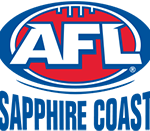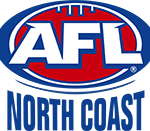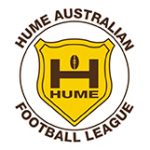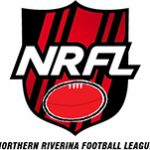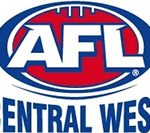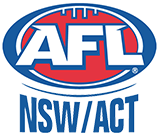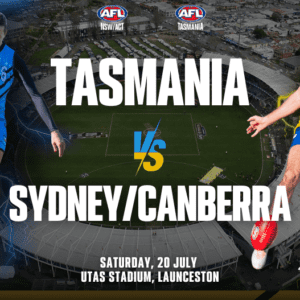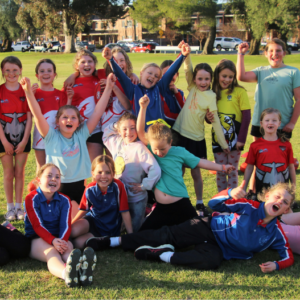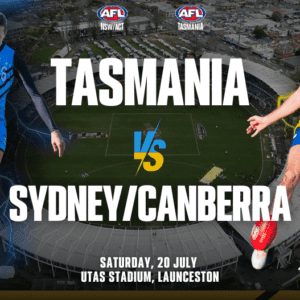Auburn GIANTS stand tall
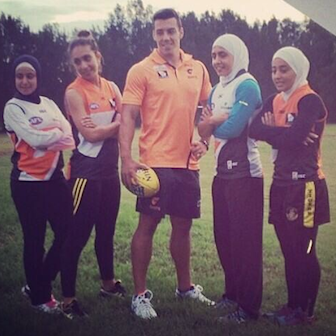
This article originally appeared on The Guardian Australia website.
By Patrick Skene
Australian Football is a prolific producer of underdog stories and this year one quietly unfolded deep in what Collingwood Chairman Eddie McGuire once dismissed as “the land of the falafel”.
I had read about the Auburn Giants Australian Football team, the first to be made up of Muslim women, and assumed it would disband when the grant money ended or the girls lost interest and fled back to their soccer DNA – an assumption that proved to be false.
The Giants were originally an offshoot of the Auburn Tigers men’s Muslim team, which recently folded, leaving the ladies to carry the torch for Auburn’s civic pride.
Earlier in the year I had stumbled upon a video which showed the Auburn Giants celebrating a win after a GWS Giants curtain raiser game at Spotless Stadium. In a unique post match celebration, the Lebanese drums banged amongst joyous whooping with each player taking turns to show her best Arabic dancing moves; it was certainly a sight to behold in an Australian football dressing room.
I decided to check out their last game of the season at Blacktown Sports Park where they were playing the Southern Power who were undefeated on 15-0 and one game away from a perfect regular season.
It turned out to be a tale of two cities. Southern Power proudly represent the Sutherland Shire, the land of Cronulla, Scott Morrison and Puberty Blues: their players were mostly Anglo, strong, tall and athletic.
The Auburn Giants charged onto the field, proud players from the diverse City of Auburn, a land of 100 tongues and 1,000 dishes with a Turkish mayor and a population that according to the last census was 42% Muslim. The Giants, despite their name, were smaller than Southern Power, mostly Lebanese – the team also included Fijian, Anglo and Chinese players – some in black or white hijabs and others in tracksuit pants or long shorts, now acceptable as part of the new inclusive AFL uniform rules. A lone pram sat empty on the sidelines and a young baby was smothered in hugs and kisses by the interchange players.
Unfortunately, with Giants players down injured, the game descended into a mismatch with Southern Power winning 92-0. Pedigree had trumped passion.
The Giants coach, Christian Kunde, was philosophical. “It was really great to see they didn’t give in. One thing I have tried to instil in them is to crack on no matter what. That’s what they did today.”
He had reason to be positive. The Giants won four games in their first three years of existence and this year they had won seven to make the finals. No wonder the girls were so upbeat and seemingly immune to the loss.
Kunde became the Giants coach almost by accident. He had volunteered to be the club doctor for 2014 but after an advertisement for a permanent coach failed to attract interest, he took on the position. His coaching model is unique: he phones and emails in the drills for each week’s training from Albury, where he is based on a clinical attachment. He drives eight hours each weekend to visit his family home on the Central Coast and down the M1 to coach the Giants.
I asked Kunde what his biggest challenges were. He said they were still getting a mixed reaction from some of the players’ families, and added that racism was still a problem. “We’ve lost 10 or 15 players who have left the game due to racism,” he said.
The following week the Giants got their first taste of finals football as they took on the UTS Shamrocks in the women’s second division elimination semi-final. Blacktown Sports Park was bleak, the sky gunmetal grey and spitting angry rain with spectators of both teams up close and personal in the dry covered area.
The first quarter was all Giants as they came out with finals intensity. Their No6, Lael Kassem, was everywhere, smothering and running the ball: football poetry in a white hijab. Kassem co-founded the team, her love of Australian football passed on by osmosis from her nine brothers.
After a head clash, the Giants’ No5, Amna Karra-Hassan, was bleeding from the cheek but waved the stretcher away. She is a perfect example of the new generation of Australian Muslim leaders. She works for the Australian federal police as a community liaison officer and serves on the Youth Advisory Council for the Community Relations Commission.
Karra-Hassan is another co-founder of the Giants, and the story of getting the team sanctioned by the community is a triumph of persistence. Wishing to be respectful to her religion and elders, Karra-Hassan followed the appropriate processes to establish the team, which included engaging the local imams to gauge whether participation was acceptable.
The applicability of the Islamic legal concept of Maslaha (for common good) was discussed and it was finally agreed that a women’s team would bring benefit to the community by removing players from wasting time or negative influences. Uniforms could be adapted for modesty and casual interactions with men managed through scheduling, including the absence of night games. The club was to be founded and run independently of men, which meant that they had to learn fast about how to run a footy club. With these guidelines in place, the Imams gave her approval and in 2011 the adventure began.
And here they were, the co-founders in torrential rain, side by side, fighting a muddy arm wrestle with the UTS Shamrocks. They were joined by Amna’s sister Liali Karra-Hassan, number 32 also in a white hijab and team captain.
Kunde shook his head: “Liali’s got a grade two ankle ligament tear and can’t change direction. She was in a moonboot last week and shouldn’t be playing but she insisted. She’s hardcore, like all personal trainers. She introduced the ice water punishment at training for any major skill errors.”
Liali and Lael had both been selected to play in the Sydney AFL Women’s representative team this year, a huge leap forward for a community that did not have a single player five years ago.
The second quarter kicked off and quickly reverted to rugby style trench warfare, both teams ferreting for the ball in puddles. Brave and limping slightly, Liali sailed through the pack to collect a loose ball.
“That’s over 20 possessions today, on one leg!” Kunde said with a wince and a smile. “We have four of our top five players out. One with a broken leg, another with a broken arm, but other girls have stepped up in new positions.”
The security guard for the game was standing next to me in fresh fluro. “Mate, I can’t believe it,” he said out the side of his mouth. “I’m a Leb and I never seen this – Lebo women playing footy. Part of me says no good, another part says, why not?”
The siren sounded with the Shamrocks victorious 47 to 14. The Shamrocks had finally ground down their exhausted opponents and peppered seven unanswered goals. The fairytale was over.
As the brutal battle for Australian sporting hearts and minds moves into its next phase, the AFL’s most important future asset is not the next draft pick from country Victoria but new immigrant converts like this group of women with Phar Lap-sized hearts. If you get a chance next season, check out this merry band of sister pioneers, who have overcome great barriers to play a game they have grown to love. It’s an Australian story.




